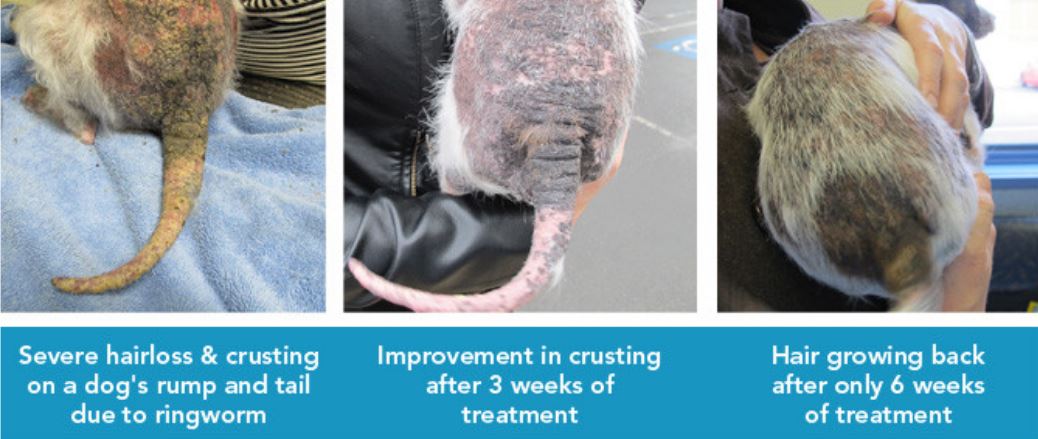Ringworm in Cats & Dogs
Does your puppy or kitten have hairless areas on their otherwise furry skin? Are there irregular shaped areas of scaling, crusting, and/or redness? Do you or family members have round circles on your skin with a red edge? Then you/your furry friend may suffer from ringworm.
Don’t worry. Ringworm is relatively harmless, yet requires correct and aggressive treatment.
VSL Clinic Manager Emma, who is currently enrolled in a Level 2 Diploma for Veterinary Care Assistants with the College of Animal Welfare in the UK, reveals everything you must know about ringworm to keep your beloved pet and your human family healthy.
What is ringworm?
Ringworm (dermatophytosis) is a common fungal infection found on both cats and dogs, particularly present in puppies and kittens. It is not a worm.
What are the clinical signs?
The fungi feed upon the dead cells of skin and hair.
In humans, this causes a typical round, red lesion with a ring of scale around the edges and normal recovering skin in the center.
In animals, ringworm frequently looks like a dry, gray, scaly patch but can also mimic any other skin lesion and have any appearance. Typical signs
- hair loss or patches of broken hair accompanied by itching
- skin crusting
- dandruff
Lesions typically first appear on an animals’ paws, legs, head and ears, but they can appear on any part of the body.

Source: theskinvet.co.nz/ringworm-in-dogs-and-cats
Now, let’s take a look who is most at risk for ringworm.
Who is affected?
Young, elderly, or long-haired dogs and cats are more commonly affected by ringworm.
The following factors determine a higher risk of ringworm transmission:
- age: puppies/kittens and elderly animals
- lifestyle: free-roaming animals
- local climate: pets living in warmer, more humid climates like Cambodia
- long-haired breeds: Persian cats, Yorkshire terrier dogs
Ringworm can be transmitted quite easily to humans, especially
- young children
- immuno-suppressed individuals
- elderly
Now, let’s take a closer look at the dermatophytosis fungus and its transmission.
Ringworm cause & transmission
The spores of the ringworm fungus are very hardy and can survive for potentially up to 18 months in favorable conditions.
- Skin contact with a spore causes infection. However, the skin must be abraded as the fungus cannot infect healthy intact skin. This means that freshly shaved, scraped, or scratched skin is especially vulnerable.
- Infection can come from direct contact with an infected carrier that does not show signs of ringworm.
- Bedding, soft furnishings, grooming brushes and towels can all contribute to the transmission of the dermatophyte fungi spores.
Skin lesions typically appear one to three weeks after exposure.
Ringworm diagnosis
Dermatophyte fungi lesions on animal skin are rarely the classic ring-shaped as in people. Animal lesions are often not itchy meaning some testing is necessary before a conclusive diagnosis and treatment can begin.
The most common means of diagnosis starts with looking at the physical examination findings, and then taking into consideration the animals’ history, breed and living conditions.
Wood’s Light (Fluorescence Light)
A Wood’s light is a lamp designed to emit light in a specific range of wavelengths. It looks similar to a black light.
The most common genus in small animal ringworm cases is Microsporum. The chemical reaction fluoresces apple green under a Wood’s light making detection quickly and easily visible.
Fluorescence first becomes detectable five to 18 days post-infection. In many cases, using Wood’s light uncovers numerous additional skin lesions that were not visible to the naked eye.
Additional means of testing include:
- microscopic examination
- fungal culture
- PCR testing
- skin biopsy
So, ringworm can be prevented, right?
Ringworm prevention
Preventing ringworm is much easier than treating it:
- wash your pet’s toys, beddings, and other accessories regularly (at least once per month)
- sweep or vacuum carpets regularly (at least once per week)
- avoid contact with ringworm infected animals and people
- take your pet to get an annual health check at your vet
A health check at VSL costs 30$ plus VAT and includes:
- 30 minutes consult with an international vet
- full nose-to-tail physical exam
- vaccination/parasite-control status check
- answering your questions and giving advice
Call VSL (023 986 640) to book your pet’s health check.
Ringworm treatment
Perseverance is the key to successful treatment particularly if there are multiple animals sharing a household. Infected animals are constantly shedding spores into the environment thus disinfection is just as important as treatment of the affected animal.
- The infected pet will require isolation while the environment is disinfected and should not be allowed back into the clean area until a culture is negative. Ideally, all animals should be tested and isolated until they are deemed clear of infection, at which point they can be allowed back into the clean area.
- Treatment is commonly oral medication, which may be supplemented with topical treatment in the form of creams, powders and shampoo. Localized lesions might respond to topical treatment only.
- Treatment with oral medication typically should not be discontinued until the repeat cultures are negative. Stopping when the pet simply looks well and is visually no longer showing symptoms frequently invites the recurrence of the disease.
Important
- The ringworm fungus can remain infectious for up to 18 months in the environment and re-infection may occur. It is important to wear gloves when handling infected animals and wash hands thoroughly afterward.
- Only use prescribed shampoo; using dog shampoo for cats can be deadly. If you are unsure, consult with your vet.
Infected pets remain contagious for about three weeks if aggressive treatment is used. Two consecutive negative fungal cultures will indicate successful treatment of the animal and is advised before stopping a course of treatment.
What’s next?
Do you suspect your pet may have ringworm? The VSL team including Dr. Lauren with a special interest in dermatology is here for you!
Call VSL (023 986 640) to book your pet consult.
We speak English, Khmer, Spanish, and German. Please specify when booking your appointment.
